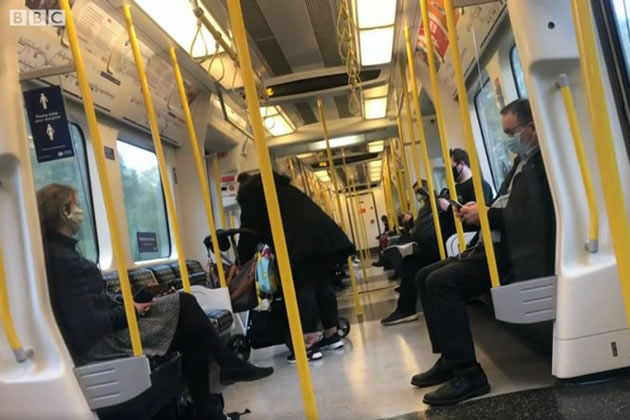Makes them condition of TfL's short term financial bailout

Falling passenger numbers due to Covid have significantly reduced revenues
The latest last minute funding package for Transport for London (TfL) has seen the government dictate more policy measures as a condition of a bailout.
The money comes with strings including a requirement to further investigate driverless change, reduce the costs of the TfL staff pension scheme, make further progress with Hammersmith Bridge and spend £50 million on active travel measures by June.
The idea of driverless trains being used on the London Underground has been put forward many times in the past although many transport experts believe it is unfeasible. It is understood that the Prime Minister is personally very enthusiastic about the concept.
The government believes that TfL's current pension arrangements, which required a contribution to staff schemes of over £400 million in the 2021 financial year are over generous. It is asking TfL to look at ways to bring the scheme into line with industry benchmarks. An independent review has already been commissioned but the RMT announced strike action last week because TfL management were unable to give them assurances that the current pension arrangements would not change.
£50 million of the funding provided by the government must go to Active Travel measures to support walking and cycling. This must be spent by June and will be subject to regular monitoring by the Active Travel Oversight Group of which the Prime Minister's transport advisor, Andrew Gilligan, is a key member.
The government has reiterated that it will only be contributing a third of the cost of Hammersmith Bridge and has required TfL to accelerate plans to restore the bridge to full operation including allowing motor vehicles to use it.
The Mayor of London, said, “While I welcome and am relieved about this funding, once again the Government has just provided a short-term funding deal that will only enable TfL to continue running transport services for a few more months.
“This agreement makes reference to future capital investment for TfL, but it’s essential that this quickly turns into a concrete commitment from the Government. The only way we will be able to avoid significant and damaging cuts to tube and bus services is if the Government steps up and provides the longer term capital funding TfL urgently needs.
“The pandemic is the only reason TfL is facing a financial crisis. TfL has a critical role to play in driving the recovery and it supports tens of thousands of jobs across the UK, but the Government’s short-term deals are trapping TfL on life support and putting economic growth and jobs at risk. Over the next few months, I urge the Government to engage with TfL and City Hall in good faith so that we can finally agree a fair, longer-term funding deal that will protect London’s transport network – for the sake of the capital and the whole country.”
Like Reading Articles Like This? Help Us Produce More This site remains committed to providing local community news and public interest journalism. Articles such as the one above are integral to what we do. We aim to feature as much as possible on local societies, charities based in the area, fundraising efforts by residents, community-based initiatives and even helping people find missing pets. We've always done that and won't be changing, in fact we'd like to do more. However, the readership that these stories generates is often below that needed to cover the cost of producing them. Our financial resources are limited and the local media environment is intensely competitive so there is a constraint on what we can do. We are therefore asking our readers to consider offering financial support to these efforts. Any money given will help support community and public interest news and the expansion of our coverage in this area. A suggested monthly payment is £8 but we would be grateful for any amount for instance if you think this site offers the equivalent value of a subscription to a daily printed newspaper you may wish to consider £20 per month. If neither of these amounts is suitable for you then contact info@neighbournet.com and we can set up an alternative. All payments are made through a secure web site. One-off donations are also appreciated. Choose The Amount You Wish To Contribute. If you do support us in this way we'd be interested to hear what kind of articles you would like to see more of on the site – send your suggestions to the editor. For businesses we offer the chance to be a corporate sponsor of community content on the site. For £30 plus VAT per month you will be the designated sponsor of at least one article a month with your logo appearing if supplied. If there is a specific community group or initiative you'd like to support we can make sure your sponsorship is featured on related content for a one off payment of £50 plus VAT. All payments are made through a secure web site. |
February 27, 2022